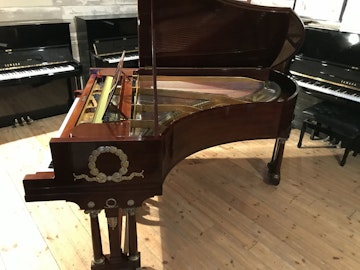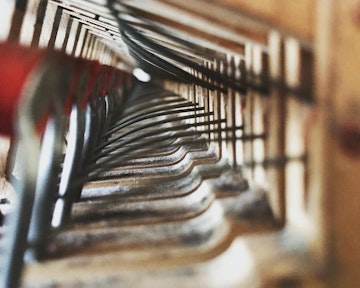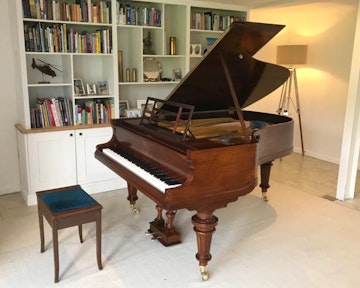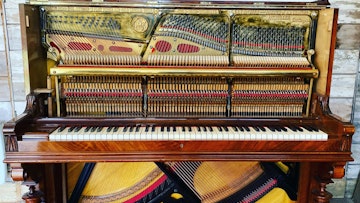Piano Repair & Restoration
From a sticky note to a full rebuild: we specialise in vintage and period pianos
Restoration
Pianos have some 4000 working parts; the work is highly skilled and encompasses casework, strungback (soundboard, frame and strings) lyres (pedal mechanisms), and of course the action.
You may require a full restoration, others merely need the instrument to be in working order for children to begin learning. All our work is tailored to your specific requirements, without compromising on essential work to bring out the original voice of the piano.
We always prefer to retain original parts if at all possible. However, sometimes many years of wear and tear necessitate like for like replacement with specialist or bespoke parts. We either make or source parts from our network of contacts across the UK and Europe. As pianists ourselves, we are extremely discerning about touch and tone. No instrument leaves the workshop until we are completely satisfied that it's playing to its fullest potential. Click here to see some examples of our completed restorations.



Casework
Casework repairs can also be undertaken: we can supply replacement mouldings or music desks, for example. At William Young Pianos we use both modern and traditional techniques to ensure a finish which is as close a match as possible to the original, both in terms of colour and sheen level.
We also offer re-polishing services in a variety of finishes to suit your individual requirements and budget.
Polishing can be independent of other work on your piano or can be undertaken as part of a more extensive restoration. From sun fading on a much-loved family heirloom to the full restoration of a fire damaged concert grand piano, we provide a professional and reliable service. Both modern lacquer and traditional finishes are available, although many clients prefer to stay loyal to their piano’s original French polished finish.
Polyester finishes
We can undertake small repairs to polyester pianos in-house. Larger areas of polyester repair can be arranged upon request.
With many years’ experience in working with top name pianos including Steinway, Bechstein, Blüthner and Bösendorfer, we work closely with insurers and piano dealers as well as private clients. William Young Pianos is relied upon by numerous customers throughout the UK to sensitively and carefully restore or rescue the patina that is such an integral part of a treasured instrument.
We undertake most of our own piano moves, but in particularly busy periods or for long distance moves we sometimes work with trusted piano removal partners. All firms we use are highly experienced in moving pianos and fully insured.

Restore your piano’s charm
Contact our team of experts to bring your piano back to its former glory
Contact usFrequently asked questions
What is restoration?
There is of course a significant difference between repair and restoration, and the definitions of both always depend on the individual piano.We undertake numerous repairs on every kind of piano imaginable. With over 4,000 working parts (many of which are made from wood, as well as consumables such as tapes and springs in the actions) there are dozens of common repairs. If these are isolated and the rest of the piano remains in good condition, many small repairs can be done by an experienced tuner/technician at the same time as a tuning. Tom our tuner undertakes many minor repairs while on the road and will always try to achieve this where possible. However, some repairs are so significant that a piano has to be brought into the workshop, but they're still only required on a particular area of the instrument.When it comes to restoration, it's all about bringing a piano back to its previous standard, and the term is generally used to mean work that encompasses all areas of the piano. Restoration is a very time consuming and specialist job, but hugely rewarding. Whether the work is worth doing depends on the original quality and construction of the instrument. When a piano was not built to high standards in its day and now needs significant work, we will always explain when it's not economical to undertake particular work. However, many owners still require us to restore their piano, particularly when it's been a family piece for generations.When a piano has succumbed to age and the environment or treatment it's received through its life, its overall condition and usefulness decline considerably. Perhaps the casework has become damaged; parts missing; the finish stained; the action has started rattling, or the keys aren't working properly. Very often, pin blocks, pins and strings can reach the end of their useful lives, meaning that it's become impossible to tune. However, it's rare for a piano to be so far gone as to be impossible to restore - although it's common for the work needed to be so extensive that it's not strictly economical to undertake. If you're intending to keep the piano, consider any sentimental value of this particular instrument against the cost of purchasing a comparable piano. If you intend to sell or give away the piano, our advice is generally not to do more work to it than basic tuning and maintenance.We are always careful to keep as much of the original fabric of the instrument as is feasible, while ensuring that all necessary parts are replaced or refurbished to create optimum longevity for the piano. Respecting and preserving signs of a piano's life while ensuring that it continues as an important part of life for future generations, is always a balancing act. We work closely with clients to ensure that we tread as lightly as possible, while bringing back your piano's original appearance and voice to the greatest extent that we can.
How long does a piano restoration take?
Full restoration can take several months, especially factoring in waiting for parts. Smaller jobs can often be completed within a week or two, again dependent on availability of parts and materials. Some small repairs can be undertaken in situ, but the majority of work, and all proper restoration jobs, will need to be undertaken in the workshop.
How often should I have my piano tuned?
Domestic pianos should generally be tuned once or twice a year. Concert pianos require tuning before rehearsal and before the performance itself, due to heavy playing, moving and the heat of stage lighting.
Restore your piano’s charm
Contact our team of experts to bring your piano back to its former glory
Contact us